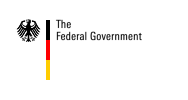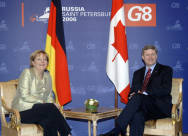The early summits were very private occasions. The so-called "fireside chats" offered Heads of State and Government an opportunity to discuss world problems together.
Since then, there has developed a system of year-round meetings at different levels, at which member states agree joint positions in different fields of policy.
The summit meetings
The annual summits are the most visible element of the G8 process. The country that holds the presidency – Germany in 2007 – invites Heads of State and Government to gather together usually some time in mid-year.
These meetings offer an opportunity for a personal exchange of views, and are also an occasion to launch G8 joint initiatives.
Alongside meetings and working dinners involving the whole group, the intimate scale also allows for bilateral discussions. Heads of State and Government make use of the opportunity for face-to-face discussion on other subjects.
Earlier, the G8 Heads of State and Government were accompanied at meetings by their foreign and finance ministers, but the great number of participants meant that the original "spirit of Rambouillet" risked being lost.
At the Birmingham summit of 1998 the British presidency therefore decided to separate the ministerial meetings from the original summit of Heads of State and Government. This format has proved to work well, and has been maintained since.
The wider process
Alongside the summits there are also regular meeting of the G8 foreign ministers to discuss foreign policy. Other ministers, responsible for example for the environment or development, also meet in the G8 framework.
Accompanied by the presidents of the national central banks, the finance ministers meet before the actual summit:
- to coordinate finance policies,
- to strengthen the international financial system, and
- to develop mechanisms to guard against financial crises.
The finance ministers also meet regularly as the G7.
Preparing the meetings
Preparatory work for discussions at summits and ministerial meetings is done by high-ranking aides, called "Sherpas" and "Sous-Sherpas" in G8 jargon, who meet several times a year.
The German Sherpa appointed by Chancellor Merkel is Bernd Pfaffenbach, State Secretary in the Federal Ministry of Economics and Technology.
Well-known figures who have been German Sherpas are former Federal Finance Minister Manfred Lahnstein, former Bundesbank president Hans Tietmeyer and the present President of the Federal Republic of Germany, Horst Köhler.
Like the others, the German Sherpa is supported by:
- a Sous-Sherpa for economic, environmental and development issues (from the Federal Foreign Office) and
- a Sous-Sherpa for financial policy (from the Federal Ministry of Finance), and
- the Political Director of the Federal Foreign Office for foreign and security policy issues.
The implementation of the G8 Africa Action Plan, in whose development the Federal Foreign Office was closely involved, is in the hands of the personal representatives for Africa of the G8 Heads of State and Government. The Federal Chancellor's personal representative for Africa is Heidemarie Wieczorek-Zeul, Federal Minister for Economic Cooperation and Development.
Expert groups
The G8 appoints expert groups on an ad-hoc basis to carry out wide-ranging investigations on particular topics, such as the non-proliferation of weapons of mass destruction or the international fight against terrorism and organised crime.
The recommendations of these groups are discussed at the summits by the Heads of State and of Government and are incorporated into the summit conclusions.

